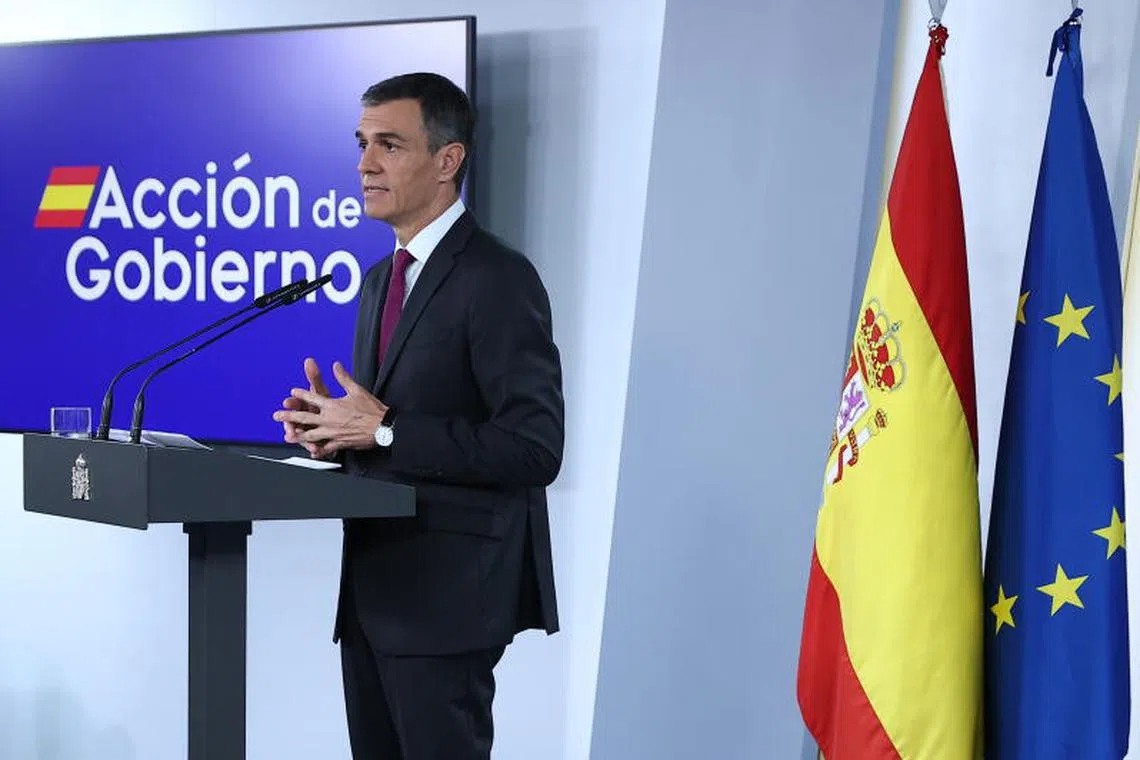Nato agrees to higher defence spending goal, Spain says it is opting out
Sign up now: Get ST's newsletters delivered to your inbox

Spanish Prime Minister Pedro Sanchez declared on June 19 that he would not commit to Nato's 5 per cent defence spending target.
PHOTO: EPA-EFE
Follow topic:
BRUSSELS/MADRID – Nato members agreed on June 22 to a big increase in their defence spending target to 5 per cent of gross domestic product (GDP), as demanded by US President Donald Trump, but Spain said it did not need to comply just days before a summit in The Hague meant to be a show of unity.
Nato officials had been anxious to find consensus on a summit statement on a new spending commitment ahead of the June 25 gathering. But Spanish Prime Minister Pedro Sanchez declared on June 19 that he would not commit to the 5 per cent target.
Nato chief Mark Rutte has proposed to reach the target
After diplomats agreed on a compromise text on June 22, Mr Sanchez swiftly proclaimed Spain would not have to meet the 5 per cent target as it would only have to spend 2.1 per cent of GDP to meet Nato’s core military requirements.
“We fully respect the legitimate desire of other countries to increase their defence investment, but we are not going to do so,” he said in an address on Spanish television.
Spain spent 1.24 per cent of GDP on defence in 2024, or about €17.2 billion (S$25.5 billion), according to Nato estimates, making it the lowest spender in the alliance as a share of its economic output.
Nato officials argue big defence spending increases are needed to counter a growing threat from Russia and to allow Europe to take on more responsibility for its own security as the US shifts its military focus to China.
Trump criticism
Mr Sanchez’s stance risked setting up a summit clash with Mr Trump, who has frequently accused European countries of not spending enough on defence and threatened not to defend them if they do not meet their targets.
On June 20, Mr Trump said Spain “has to pay what everybody else has to pay” and Madrid was “notorious” for low defence spending.
But he also suggested that the US should not have to meet the new target, as the US had spent large amounts to protect the continent over a long period. Washington spent an estimated 3.19 per cent of GDP on defence in 2024, Nato says.
But Mr Sanchez argued it was not necessary for Spain to meet the new target, and trying to do so would mean drastic cuts on social spending such as state pensions or tax hikes.
Nato did not release the compromise summit text, which will only become official when it is endorsed by the leaders of the organisation’s 32 members at the summit.
But diplomats said one tweak in the language on the spending commitment, from “we commit” to “allies commit”, allowed Spain to say the pledge does not apply to all members.
In a letter seen by Reuters, Mr Rutte told Mr Sanchez that Spain would have “flexibility to determine its own sovereign path” for meeting its military capability targets agreed with Nato.
A Nato diplomat said Mr Rutte’s letter was simply “an affirmation that allies chart their own course for making good on their commitments” to meet their capability targets.
Nato officials have expressed scepticism that Spain can meet its military capability targets by spending just 2.1 per cent of GDP, as Mr Sanchez has suggested. The targets are secret, so their costs cannot be independently verified.
“All allies have now agreed to the summit statement – which includes the new defence investment plan,” said the diplomat, speaking on condition of anonymity to discuss internal matters.
Mr Rutte had originally proposed countries meet the new target by 2032, but the deadline in the final text is 2035, according to diplomats. There will also be a review of the target in 2029. REUTERS

